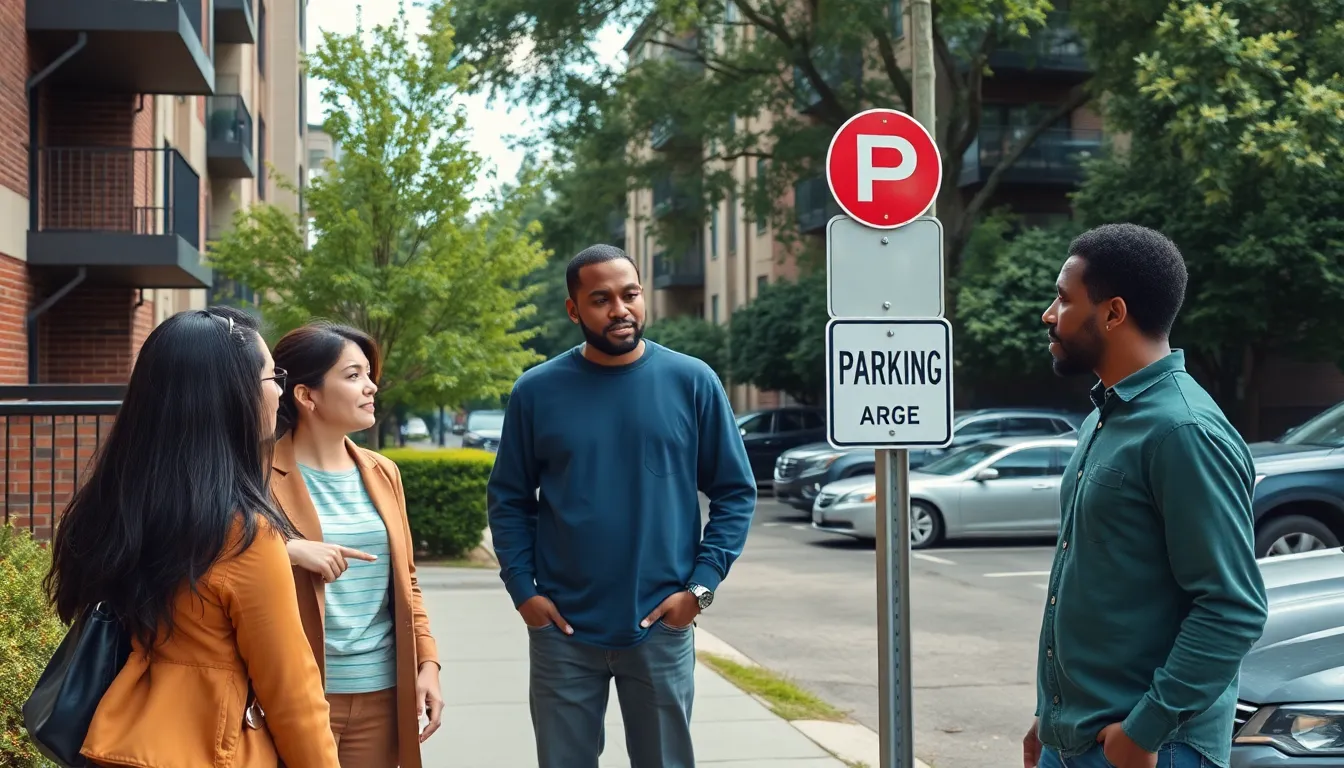Navigating the world of tenant parking rights can feel like trying to solve a Rubik’s Cube blindfolded. With rules that seem to change faster than a parking meter can tick, it’s easy to feel overwhelmed. But fear not! Understanding these rights is crucial for every tenant who wants to avoid the dreaded ticket trap or, worse, a towing horror story.
Imagine pulling into your apartment complex, only to find your designated spot occupied by a rogue vehicle. Suddenly, you’re left circling the lot like a lost puppy. Knowing your parking rights not only saves you from unnecessary stress but also empowers you to stand your ground. So buckle up as we dive into the ins and outs of tenant parking rights, ensuring you park with confidence and maybe even a chuckle or two along the way.
Understanding Tenant Parking Rights
Tenant parking rights encompass the specific entitlements that tenants possess regarding parking spaces associated with their rental properties. These rights vary based on local laws and lease agreements.
Definition of Tenant Parking Rights
Tenant parking rights refer to the legal assurances that grant residents access to designated parking areas. These rights often include the permission to use specific spots or shared parking facilities. Local regulations and lease terms dictate the extent of these rights, which may include assigned or unassigned spaces. Clarity about these rights helps tenants understand their obligations and the limitations set by property owners.
Importance of Tenant Parking Rights
Understanding tenant parking rights protects residents from potential disputes. Knowledge of these rights can lead to fewer parking violations and decrease the risk of unauthorized towing. These rights often provide peace of mind, allowing tenants to park without fear of losing their space unexpectedly. Tenants using their parking rights responsibly can foster better relations with property management. Awareness of these rights also empowers tenants to advocate for themselves in case of conflicts related to parking arrangements.
Legal Framework

Tenant parking rights are governed by various laws at the federal, state, and local levels. Understanding these legal structures helps tenants navigate their parking entitlements effectively.
Federal Laws
Federal law addresses tenant rights indirectly through regulations concerning housing and discrimination. The Fair Housing Act prohibits discrimination based on race, color, national origin, religion, sex, familial status, or disability. Although parking rights aren’t explicitly covered, violations related to these protected classes can influence parking rights in housing situations. This legal framework ensures that tenants cannot face oppressive parking policies based solely on discriminatory practices.
State Laws
State laws typically provide specific guidelines regarding tenant parking rights. Many states outline provisions in landlord-tenant acts or property laws, detailing what landlords must offer regarding parking access. Some states require landlords to maintain a designated number of parking spaces, while others mandate notification about parking restrictions. Variations exist, making it essential for tenants to review state-specific regulations to understand their rights fully.
Local Ordinances
Local ordinances play a crucial role in defining parking regulations for specific communities. Zoning laws, for instance, might dictate the required number of parking spots for residential buildings. Property owners often follow these ordinances when establishing parking policies. Tenants must familiarize themselves with local regulations to ensure compliance and protection regarding parking arrangements. Understanding these ordinances enhances tenants’ ability to address parking issues effectively.
Common Tenant Parking Issues
Tenant parking issues frequently arise, creating confusion and frustration for renters. Awareness of these challenges empowers tenants to address conflicts effectively.
Denial of Parking Access
In some cases, tenants find themselves denied access to designated parking spots. Property management may enforce rules that restrict who can park in certain areas. Understanding lease agreements helps clarify expectations regarding parking access. Statutes may also provide insights into tenants’ rights concerning parking privileges. When access is unjustly denied, residents can seek resolution through dialogue with property owners or legal assistance if necessary.
Towed Vehicles
Towing can become a significant issue for tenants unaware of their rights. Vehicles may be towed for various reasons, such as parking in unauthorized places or failure to display valid permits. Knowing the local regulations and lease terms can prevent unwanted towing situations. Lease agreements often specify penalties for unauthorized parking, including fees for towing. Tenants have a right to contest towing fees if they believe proper procedures weren’t followed, ensuring they don’t face unfair charges.
Lease Agreement Conflicts
Lease agreements sometimes create parking conflicts that lead to tenant confusion. Specific clauses can outline parking rules, but unclear language may lead to disputes between tenants and property owners. Tenants should review lease terms carefully to understand their parking rights and obligations. When conflicts arise, open communication can clarify expectations. Legal remedies exist for tenants facing unreasonable rules, promoting fair treatment related to parking rights.
Best Practices for Tenants
Understanding tenant parking rights is essential for smooth living arrangements. Empowerment comes from knowing these rights, which helps mitigate issues with landlords or property managers.
Knowing Your Rights
Tenants must familiarize themselves with their specific parking rights. Reviewing lease agreements clarifies access to designated spots and shared facilities. Different states have varying laws impacting these rights. Awareness of local regulations can provide additional protections. Engaging with local tenant organizations may offer valuable insights into one’s rights. Empowerment through knowledge leads to more informed conversations with landlords.
Communicating with Landlords
Open communication plays a vital role in effective landlord-tenant relationships. Addressing parking issues directly with property managers can prevent escalation. Tenants should articulate concerns clearly, focusing on specific incidents or misunderstandings. Seeking clarification on policies fosters understanding and cooperation. Regular discussions create opportunities for mutual agreement on parking needs. Building rapport with landlords can also lead to flexibility in arrangements.
Documenting Parking Issues
Keeping detailed records of parking-related incidents is crucial for tenants. Photos of occupied spots or towing notices serve as reliable evidence. Maintaining written correspondence with landlords creates a clear trail of communication. Notes on conversations can be handy during disputes, providing context to claims. Tenants benefit from organizing this information, as it strengthens their position. Consistent documentation aids in resolving issues efficiently and effectively.
Resources for Tenants
Accessing reliable resources helps tenants better understand their parking rights. Various organizations and online platforms provide valuable information and support.
Legal Aid Organizations
Legal aid organizations offer free or low-cost assistance to tenants facing challenges related to parking rights. These entities typically include local legal service providers and nonprofit groups. They provide guidance on relevant laws and can represent tenants in disputes with landlords. Resources from legal aid may include educational materials outlining tenant rights and step-by-step processes for filing complaints. It’s essential for tenants to locate these organizations in their area for tailored assistance.
Government Websites
Government websites serve as vital sources for information on tenant parking rights. State and local housing agencies often publish guidelines summarizing relevant laws and regulations. These websites clarify tenants’ entitlements and responsibilities regarding parking. Each site frequently features FAQs, downloadable resources, and contact information for further inquiries. Tenants should bookmark these sites for quick access to accurate regulatory details that ensure compliance.
Tenant Advocacy Groups
Tenant advocacy groups empower residents by providing information and support specifically about parking rights. These organizations often conduct workshops focusing on legal education and community resources. They facilitate peer networks where tenants can share experiences and strategies. In addition, advocacy groups engage in lobbying efforts to influence policy changes that benefit renters. Joining such groups can equip tenants with tools and knowledge necessary for advocating effectively.
Tenant parking rights are essential for maintaining peace of mind and ensuring fair access to designated spaces. By understanding these rights and the legal frameworks surrounding them, tenants can navigate potential conflicts with confidence. Open communication with landlords and thorough documentation of parking incidents can significantly reduce misunderstandings and disputes.
Utilizing available resources empowers tenants to advocate for themselves effectively. As they become more informed about their entitlements, they can foster better relationships with property management and enhance their overall rental experience. With the right knowledge, tenants can turn parking challenges into manageable situations.
